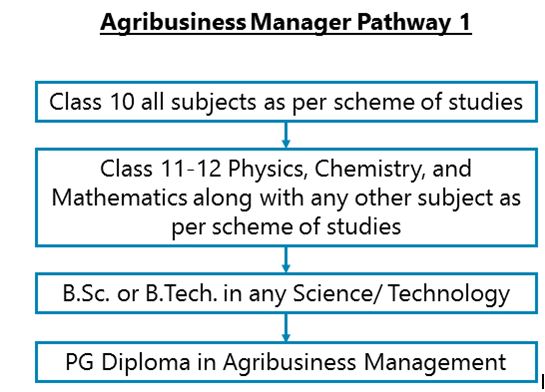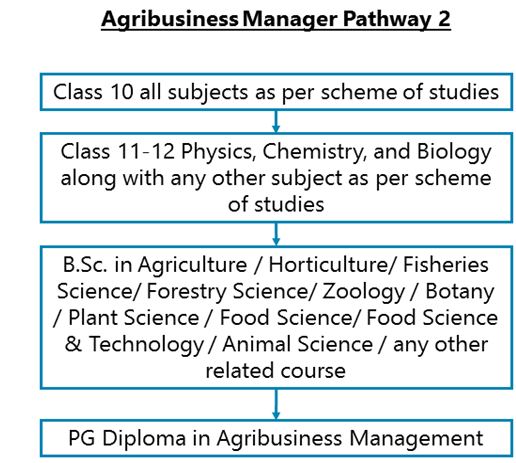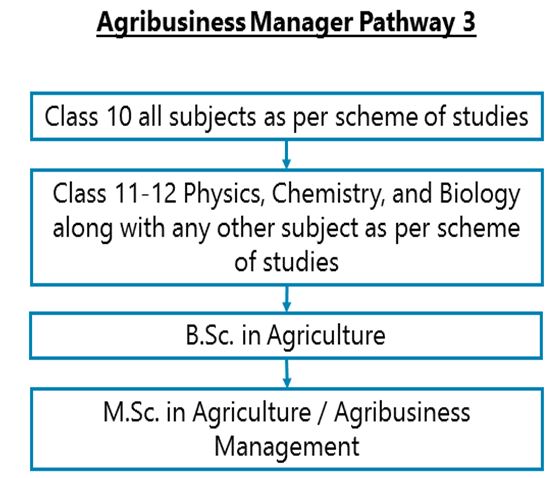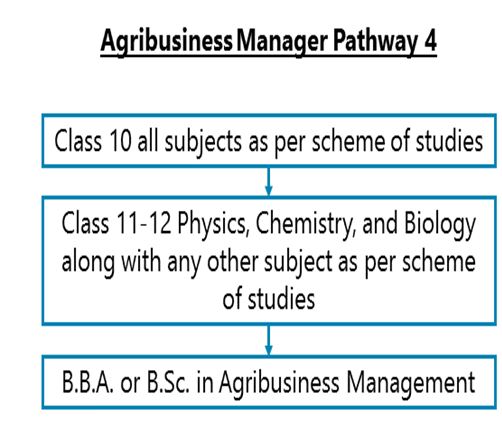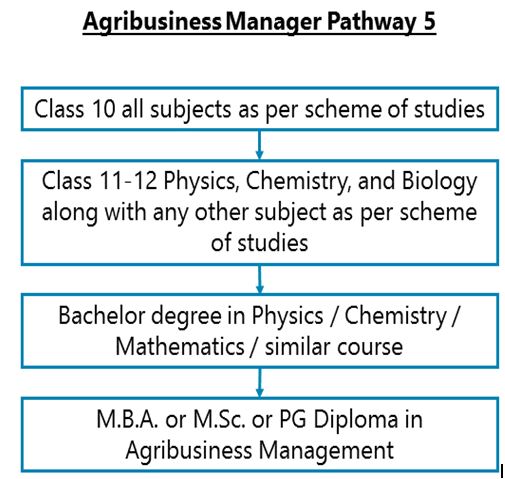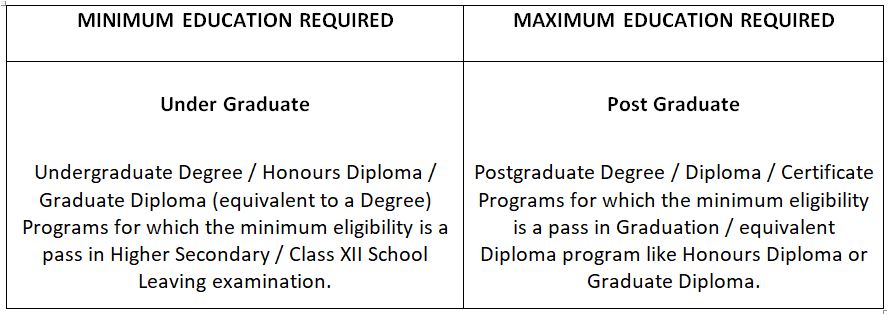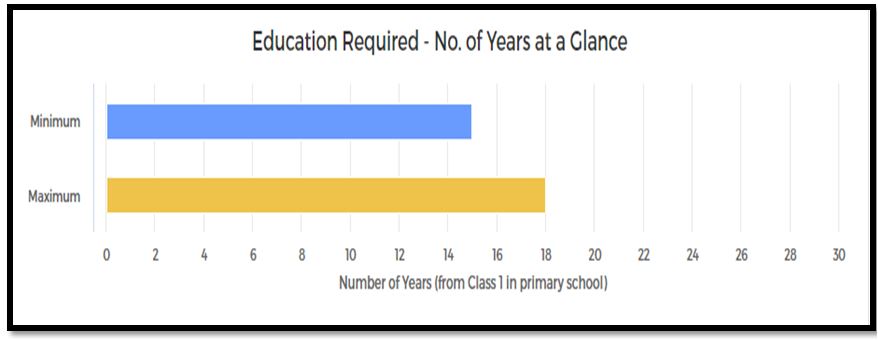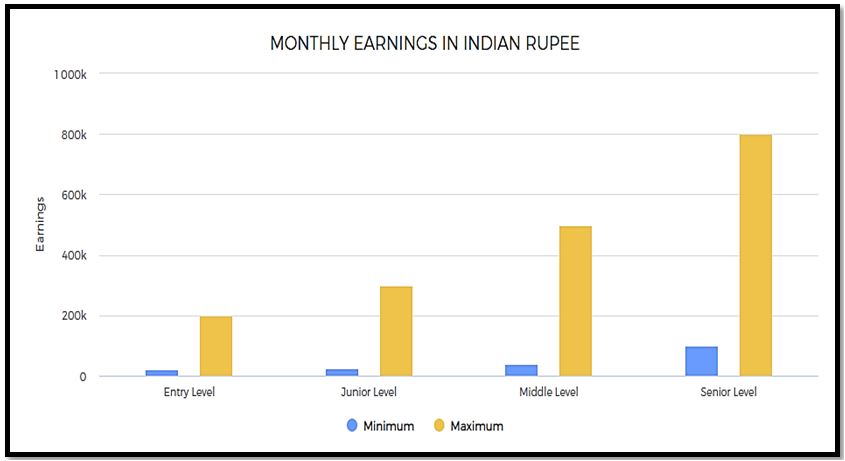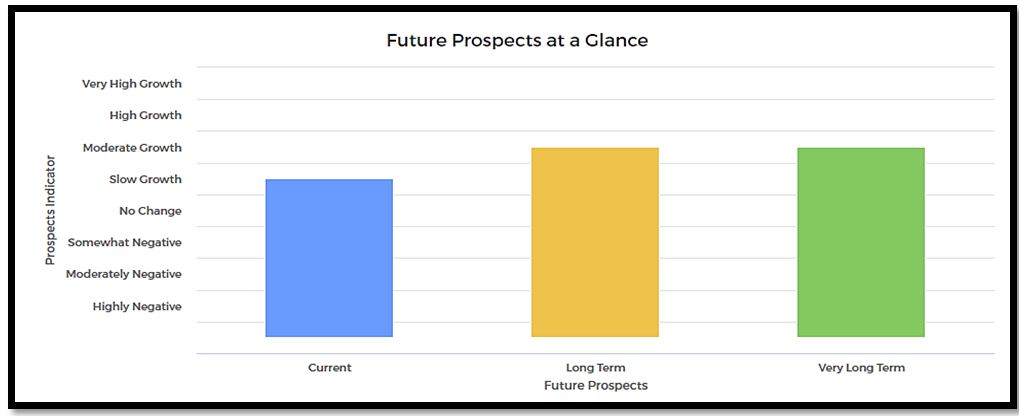Agribusiness Manager
Entry Level Qualification
Graduate
Career Fields
Business & Management
For Specially Abled







Career Entrance Exam
About Career
Agribusiness Managers are involved in planning, organising, leading and administration of businesses which deal with agricultural inputs and outputs. For example, businesses or organisations involved in producing seeds and other agriculture inputs; businesses involved in production of agrochemicals or agricultural chemicals like insecticides, pesticides, and herbicides; businesses involved in animal husbandry such as dairy farms, poultry farms, animal farms, etc.; businesses involved in organised farming, crop production and distribution, food processing, food retailing and marketing; businesses involved in manufacturing and maintenance of agricultural machinery; and so on.
Depending upon your specialised area of work, as an Agribusiness Manager, you will be involved in strategic and day-to-day operational planning in agribusiness organisations. You will estimate costs and prepare budgets. You will manage all the financial transactions and related activities. You will recruit staff members and train them. You will ensure all business activities are done as per plans. You will market and sell various products produced by the agribusiness organisations. You will be involved trading of agricultural products in domestic and international markets. You will be involved in using IT technologies in managing the business activities in agribusiness organisations.
Key Roles and Responsibility
As an Agribusiness Manager, you will be involved in the following roles and responsibilities:
1. As an Agribusiness manager you would evaluate the business and the amount of money a farm or agricultural business is collecting.
2. As an Agribusiness manager you would keep records of planting and harvesting times and identify when a crop or livestock is in demand.
3. As an Agribusiness manager you would coordinate and give workshops in agricultural marketing and its issues that will help in straightening out the problems that the staff is experiencing.
4. As an Agribusiness manager you would also prepare and develop training modules.
5. As an Agribusiness manager you would make database that supports their establishment in order for the farmers as well as the consumers to be well informed of the stocks that they have or are offering.
6. As an Agribusiness manager you would also be responsible in making deals and contacts with exporters and logistics to be able to ship out the products being offered.
PARTICULARS | DESCRIPTION |
Name | Agribusiness Manager |
Purpose | Monitoring and Evaluating Farm |
Career Field | Business & Management |
Required Entrance Exam | CAT |
Average Salary | 3,00,000 - 20,00,000 Rs. Per Year |
Companies For You | Monsanto, National Seeds Corporation Ltd & Many More |
Who is Eligible | Class 10th Pass |
Career Entry Pathway
Class 10 all subjects as per scheme of studies – Class 11-12 Physics, Chemistry, and Mathematics along with any other subject as per scheme of studies – B.Sc. or B.Tech. in any Science/ Technology – PG Diploma in Agribusiness Management
After completing Class 11-12 Physics, Chemistry, and Mathematics along with any other subject as per scheme of studies, you can pursue graduation in B.Sc. or B.Tech in any science/Technology course. After having completed graduation, you can go for a Post-Graduate Diploma in Agribusiness Management.
Class 10 all subjects as per scheme of studies – Class 11-12 Physics, Chemistry, and Biology along with any other subject as per scheme of studies – B.Sc. in Agriculture / Horticulture/ Fisheries Science/ Forestry Science/ Zoology / Botany / Plant Science / Food Science/ Food Science & Technology / Animal Science / any other related course – PG Diploma in Agribusiness Management
After completing Class 11-12 Physics, Chemistry, and Biology along with any other subject as per scheme of studies, you can go for a graduation B.Sc. Agriculture or other related courses like B.Sc. in Horticulture/ Fisheries Science/ Forestry Science/ Zoology / Botany / Plant Science / Food Science/ Food Science & Technology / Animal Science. After having completed graduation in Agriculture or related course, you can go for a Post-Graduate Diploma in Agribusiness Management
Class 10 all subjects as per scheme of studies – Class 11-12 Physics, Chemistry, and Biology along with any other subject as per scheme of studies – B.Sc. in Agriculture – M.Sc. in Agriculture / Agribusiness Management
After completing Class 11-12 Physics, Chemistry, and Biology along with any other subject as per scheme of studies you can go for a graduation in B.Sc. Agriculture. After having completed graduation in B.Sc. in Agriculture, you can go for M.Sc. in Agriculture or Agribusiness Management.
Class 10 all subjects as per scheme of studies – Class 11-12 Physics, Chemistry, and Biology along with any other subject as per scheme of studies – B.B.A. or B.Sc. in Agribusiness Management
After completing Class 11-12 Physics, Chemistry, and Biology along with any other subject as per scheme of studies, you can pursue B.B.A. or a B.Sc. in Agribusiness Management in your graduation.
Class 10 all subjects as per scheme of studies – Class 11-12 Physics, Chemistry, and Biology along with any other subject as per scheme of studies – Bachelor degree in Physics / Chemistry / Mathematics / similar course - M.B.A. or M.Sc. or PG Diploma in Agribusiness Management
After your Class 11-12 Physics, Chemistry, and Biology along with any other subject as per scheme of studies. Then you can opt to do a Bachelor degree in Physics / Chemistry / Mathematics / a similar field. Then you can opt to do an M.B.A. or PG Diploma in Agribusiness Management.
Class 10 all subjects as per scheme of studies – Class 11-12 with any subject combination as per scheme of studies – Bachelor degree in any subject – PG Diploma in Agribusiness Management
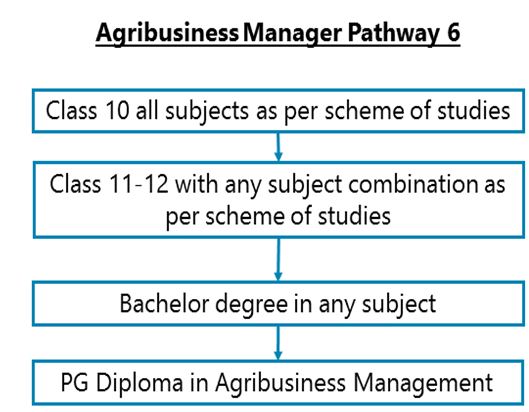
After completing Class 11-12 with any subject combination as per scheme of studies, pursuing bachelors in any subject, you can work in Agribusiness Management. After graduation in any subject, you can go for a Post-Graduate Diploma in Agribusiness Management.
Required Qualification & Competencies
After class 11-12, you can go for graduation in B.Sc. in any science related course like Agriculture / Horticulture/ Fisheries Science/ Forestry Science/ Zoology / Botany / Plant Science / Food Science/ Food Science & Technology / Animal Science or a degree in B.E. or B.Tech. in Agricultural Engineering. After completing graduation, you can go for a M.Sc. in Agriculture or an MBA / PGDM in Agribusiness Management.
You may also study for any B.Sc or in any other field of your choice and then do an MBA / PGDM in Agribusiness Management.
COMPETENCIES REQUIRED
1. Interests
Enterprising: You should have interests for Enterprising Occupations. Enterprising occupations involve taking initiatives, initiating actions, and planning to achieve goals, often business goals. These involve gathering resources and leading people to get things done. These require decision making, risk taking and action orientation.
Conventional: You should have interests for Conventional Occupations. Conventional occupations involve repetitive and routine tasks as well as fixed processes or procedures for getting things done. These occupations involve working more with data, systems, and procedures and less with ideas or creativity.
Social: You should have interests for Social Occupations. Social occupations involve helping or assisting others; these involve working with and communicating with people to provide various services; these may involve educating and advising others.
2. Abilities
Abstract Reasoning: The ability to understand ideas which are not expressed in words or numbers; the ability to understand concepts which are not clearly expressed verbally or otherwise.
Articulation: The ability to speak clearly so others can understand you.
Deductive Reasoning: The ability to apply general rules and common logic to specific problems to produce answers that are logical and make sense. For example, understanding the reasons behind an event or a situation using general rules and common logic.
Emotional Intelligence: The ability to understand your own and others' emotions and feelings; empathy for others; adjusting your behaviour or self-control and self-regulation according to others' emptions and situations.
Fluency of Ideas: The ability to come up with a number of ideas about a topic (the number of ideas is important, not their quality, correctness, or creativity).
Inductive Reasoning: The ability to combine pieces of information from various sources, concepts, and theories to form general rules or conclusions. For example, analysing various events or situations to come out with a set of rules or conclusions.
Inter-Personal: The ability to build and maintain good relationships with others at workplaces and elsewhere.
Intrapersonal: The ability to clearly understand your strengths and weaknesses, what your capabilities are, what you can do and cannot do, what you like and dislike.
Numerical Reasoning: The ability to add, subtract, multiply, divide, and perform other basic numerical calculations correctly.
Oral Comprehension: The ability to listen to and understand information and ideas presented through spoken words and sentences.
Oral Expression: The ability to communicate information and ideas in speaking so others will understand.
Originality: The ability to come up with unusual or innovative ideas about a given topic or situation, or to develop creative ways to solve a problem.
Problem Sensitivity: The ability to tell when something is wrong or is likely to go wrong. It does not involve solving the problem, only recognizing there is a problem.
Verbal Reasoning: The ability to think and reason with words; the ability to reason out ideas expressed in words.
Written Comprehension: The ability to read and understand information and ideas presented in writing.
Written Expression: The ability to communicate information and ideas in writing so others will understand.
3. Knowledge
Administration: Knowledge of various administrative and operational functions in managing a business or an organisation such as general administration, facility management, front office management, back office management, etc.
Business Management: Knowledge of managing a business which involves planning of what to do, organising resources and people, leading and supervising work activities of people, and monitoring performances of people as well as performance of business. This includes knowledge of marketing, finance, human resources management, operations management, etc.
Human Resources: Knowledge about the theories and procedures for recruitment, selection, induction, placement, compensation, performance management, training and development and various other aspects of human resources in organisations.
Marketing: Knowledge of the various principles, theories, methods, systems and processes to understand the needs of a category of customers and then creating, communicating, and delivering various products and services in order to satisfy the needs of the customers.
Production and Processing: Knowledge of raw materials, production machinery, production systems, production processes, quality control, and other techniques for manufacturing or construction and distribution of goods.
Sales and Promotion: Knowledge of the various principles, theories, methods, systems and processes to communicate and promote the benefits of various products or services of an organisation to a targeted group of customers, influencing their buying decisions and convincing them to buy the products or services.
4. Skills
Active Learning: Focused and continuous learning from various sources of information, observation and otherwise for application in getting work done.
Active Listening: Giving full attention to what other people are saying, understanding the points being made by others, asking questions, etc.
Communication in English: Skills in communicating effectively in writing as well as verbally with others in English language.
Coordination: Skills in working together with other people to get things done.
Critical Thinking: Skills in analysis of complex situations, using of logic and reasoning to understand the situations and take appropriate actions or make interpretations and inferences.
Directing: Skills in directing others' actions to get things done.
Instruction: Skills in training others how to do something.
Judgment and Decision Making: Skills in considering pros and cons of various decision alternatives; considering costs and benefits; taking appropriate and suitable decisions.
Managing Financial Resources: Skills in determining how money should be spent to get the work done, and accounting for these expenditures.
Managing Human Resources: Skills in motivating, developing, and leading people as they work, identifying the best people for the job.
Managing Material Resources: Skills in sourcing, buying, storing, and use of appropriate raw materials, machines, equipment, and devices for various purposes such as industrial manufacturing, building construction, etc.
Negotiation: Skills in bringing others together and trying to reconcilSe differences.
Persuasion: Skills in persuading others to change their minds or behaviour.
Problem Solving: Skills in analysis and understanding of problems, evaluating various options to solve the problems and using the best option to solve the problems.
Reading Comprehension: Skills in understanding written sentences and paragraphs in work related documents.
Selling: Skills in promoting and canvassing about various products and services to prospective customers; influencing their decisions to buy the products and services; and making sure that they get the delivery of the products and services.
Service Orientation: Skills in or keen interest to help and assist people.
Supervising: Skills in Supervising and monitoring performance of others, businesses, and different projects.
Time Management: Skills in prioritizing work, managing time effectively.
5. Personality
1. You are always or mostly organised in your day-to-day life and activities.
2. You always feel secure in your surroundings and in most situations.
3. You are always self-satisfied or feel satisfied with your life in most situations.
4. You are a soft-hearted person sometimes.
5. You trust others sometimes but not always.
6. You are helpful to others sometimes.
7. You remain calm in difficult situations sometimes but some other times you are anxious.
8. You are imaginative sometimes.
9. You prefer to experience new things and have new experiences sometimes.
10. You act independently sometimes but do not do so in some other times.
11. You are caring, supportive, sympathetic and kind to others sometimes.
Career - Job Opportunities & Profiles
As a graduate or a Post-Graduate in Agribusiness Management you can find job opportunities in:
1. Seed Technology and Production Companies like Monsanto, National Seeds Corporation Ltd., KGOC (Krishidhan Group of Companies)

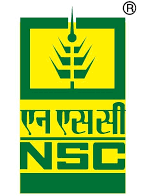
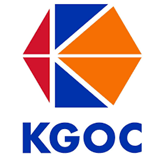
2. Fertiliser Production Companies like Hindalco Industries, The Fertiliser Corporation of India, Tata Chemicals Ltd.etc.;

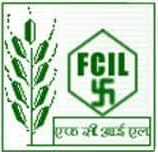
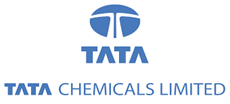
3. Food Processing Companieslike Hindustan Unilever, ITC Foods, LT Foods Ltd., Britannia, Nestle, etc.



4. Agricultural and food trading and marketing companies like ITC Limited.
5. Agricultural Co-operative firms like National Agricultural, Cooperative Marketing Federation of India Limited (NAFED Ltd), Tribal Co-Operative Marketing Development Federation of India Limited, etc.;
6. Agricultural machinery manufacturing companies like Deccan Farm Equipment Private Limited, Harvel Agua India Private Limited, etc.
7. Companies involved in providing agricultural loans and microfinance such as Bandhan Bank.
8. If you wish to go for NGOs involved in rural and agricultural development you can find various job opportunities in Association for Social Service and Rehabilitation of the Aged (ASSRA) involved in sectors working in- Education & Literacy, Health & Family Welfare, Aged/Elderly, Differently Abled, Environment & Forests, Rural Development & Poverty Alleviation; A.P.J. Abdul Kalam minority trust etc.
SPECIALISATION TRACKS IN THIS CAREER
Agricultural Finance
Agricultural Finance Professionals are involved in providing financial aid for agriculture-related activities. They help in empowering poor farmers to increase their wealth and food production as well provide financial services ranging from short, medium and long-term loans for growing and harvesting, gradating, packing transportation, storage, sale, and distribution.
Agriculture Marketing
Agriculture Marketing Professionals are mainly involved in planning, organizing, directing and handling of agricultural produce so as to meet the requirements of farmers, intermediaries, and consumers. They are involved in numerous activities like planning production, growing, and harvesting, packaging, transportation, agro-and food processing, acquiring market information, advertising, and many others.
Food Supply Chain Management
Food Supply Chain Manager is involved in the Logistics and IT, R&D Solutions, Manufacturing and packaging, Finance and Insurance Companies, local distributors, Quality control of all the agriculture-related activities.
ICT in Agriculture
Information and Communication Technology Professionals are involved in conceptualising, designing and developing innovative ways to use information and communication technologies in the rural area.
Agricultural Communication
Agricultural Communication Professionals are involved in communicating about agriculture-related information among agricultural stakeholders such as farming, production, harvesting and cultivation and non-agricultural stakeholders such as food, fiber (e.g., cotton), animals, rural issues, and natural resources.
CAREER GROWTH
As there are many opportunities in this career, growth pathways are also different. For example:
After an MBA/PG Diploma in Agribusiness Management, you join as a Management Associate. You will progress as Management Associate - Assistant Manager (Production/Vigilance) – Manager – Senior Manager – AGM / AVP – VP/GM – Chief Operating Officer – Chief Executive Officer.
If you wish to enter government sector you can work for various NGOs starting as an Assistant or a Trainee and progress towards Program Assistant then Program Manager followed by Project Manager or even a Project Head.
Salary Offered
1. At Entry level, you may earn around Rs. 20,000 – 2,00,000 or more per month. The higher salaries are offered to Post Graduates from premier institutions like IIM Ahmedabad.
2. At junior level, you may earn around Rs. 25,000 – 3,00,000 or more per month.
3. At mid-Level, you may earn around Rs.40,000 – 5,00,000 or more per month.
4. At senior level, you may earn around Rs. 1,00,000 – 8,00,000 or more per month.
Monthly Earnings In Indian Rupees
1. Entry level: 0 - 2 years of work experience
2. Junior Level: From 1 to 12 years of work experience
3. Mid-Level: From 5 to 20+ years of work experience
4. Senior Level: From 10 to 25+ years of work experience (there could be exceptions in some high-end technical, financial, engineering, creative, management, sports, and other careers; also in the near future, people will reach these levels much faster in many careers and in some careers, these levels will have no meaning as those careers will be completely tech skill driven such as even now, there is almost no level in a Cyber Security Expert’s job)
Work Activities
Analysing and interpreting data and information: Analysis of data and information to find facts, trends, reasons behind situations, etc.; interpretation of data to aid in decision making.
Coaching and developing: Identifying training and professional development needs of others; coaching and training them to develop skills to perform tasks and improve performance.
Communicating with co-workers and others: Communicating with people in writing, verbally or otherwise inside your workplace and various other people who have professional relationships with your place of work including vendors, government officials, etc. or with people at large.
Communicating with customers: Communicating with potential and existing customers of your organisation in writing, verbally or otherwise.
Decision making and problem solving: Analysis of data and information; evaluation of alternative decisions and results of decisions; taking the right decisions and solving problems.
Developing and maintaining inter-personal relationships: Developing professional relationships with co-workers and others outside organisations and maintaining good relationships.
Estimating quantity, cost, time and resources: Estimating sizes, volumes, distance, and quantity; estimating and determining time, costs, and resources; estimating materials required to perform a task.
Getting Information and learning: Observing, hearing, reading, using computers, or otherwise obtaining information and learning from it.
Handling administrative activities: Handling various administrative tasks and managing day-to-day operations.
Inspecting situations, events, and people: Inspecting situations, events and people to understand the reasons and causes for the situation or events to happen; inspecting people to understand reasons behind their behaviour and actions.
Leading: Inspiring and motivating co-workers to work to achieve specific goals; enabling and facilitating others to perform tasks effectively; addressing issues and solving problems in order to help people perform well.
Managing and supervising: Manging and supervising work of others; setting goals; giving instructions; monitoring work performance, etc.
Negotiating: Negotiating terms, conditions, costs, prices and about other issues.
Organising, planning and prioritising tasks: Planning and organising tasks in order to achieve work goals; prioritising tasks to achieve goals and making the best use of the time available.
Providing advices and consultation to others: Giving advices or consultation to others about various issues, conceptual matters, know-hows, scientific matters, products or services.
Recruiting, enlisting and placing people resources: Sourcing, recruiting, selecting, enlisting and placing people in different positions and tasks in an organisation or for getting work done.
Scheduling tasks: Scheduling project timelines, tasks and activities.
Selling: Communicating about products and services with potential customers; influencing customers' decisions to buy products and services; helping people to buy products and services.
Strategic planning: Developing visions and goals, developing strategies and action plans for achieving visions and goals.
Working in a team: Working in a team of people; developing team; maintaining professional relationships among team members.
Future Prospects
The Indian Food Industry is the fastest growing Industry and is contributing to the world food trade every year. It is around 32 per cent of the country’s total food market, one of the largest industries in India and is ranked 5thin terms of production, consumption, export and expected growth. The total agricultural exports in the FY 10-18 from India grew at CAGR of 16.45% to US$ 38.21 Billion in FY18.
According to BNEF reports, Agriculture sector in India is estimated to be one of the major drivers of the economy. Under the budget Agricultural Marketing Infrastructure (AMI) scheme 40 lakh MT of storage capacity & 400 other marketing Infrastructure projects are targeted by 2019-20. Moreover, Government of India is planning on introducing several projects to support the agriculture sector. Some of them include Pradhan Mantri Krishi Sinchayee Yojana, Long Term Irrigation Fund, Pradhan Mantri Fasal Bima Yojana etc.
According to the Union Budget of 2019-20, around US$ 565.16 million has been allocated to the Government Initiated schemes which means more demand and job opportunities in this Career.
Future Prospects At A Glance

